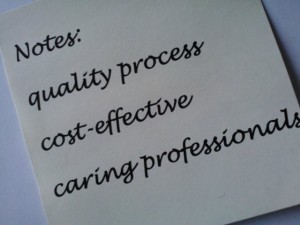 In Part I of this series titled “Getting Unmarried” (my story)
In Part I of this series titled “Getting Unmarried” (my story), I wrote about making the decision to get divorced as being the most important and most difficult step for me. I will tell you that after finally deciding to end my marriage, it was as if the weight of the world had been lifted from me. This didn’t necessarily make the rest of the process any easier, but it did change the focus of my efforts to getting from point A to point B.
Now that I had made the decision to end my 30-year marriage, my next step was to figure out how to do this. At this point I had not discussed any of this with my spouse, although we both realized our marriage was under tremendous stress once again. I didn’t have a clue where to begin. I had no prior experience myself, nor had my parents been divorced. I knew that listening to friends and family was not necessarily the best, as they naturally would find it difficult to be impartial. I knew I didn’t want a costly or high conflict divorce.
What I did want was
an open, respectful, type of process that considered both of our needs and the contributions we both made to our family during our 30-year marriage. I wanted to as much as possible be able to make decisions with my spouse about the outcomes rather than someone else making those decisions for us. I assumed that if I ran straight to an attorney, I might run the risk of the process getting out of control. At the time I didn’t personally know any family law attorneys. What I chose to do was to find out about the different alternative processes to divorce, choose the one I felt most suitable for my circumstances, discuss with my spouse with the hope we could agree to a process, and then find the attorneys who could help us achieve these goals.
While I knew, or I should say thought I knew, about the more traditional type of divorce process, this largely attorney driven (my opinion as a result of my divorce experience) method seemed too adversarial, too costly both financially and emotionally, and would not help me accomplish the goals I wanted to achieve. Although this process did not seem suitable for me, in some cases depending upon circumstances, it may be the best and sometimes the only alternative available. I would encourage anyone considering the traditional litigation type divorce process to thoroughly learn about
all the process alternatives before embarking down this path.
I had heard about mediation. From my research I learned that a mediator is an independent, neutral third party who attempts to help divorcing couples resolve their differences and come to mutual agreements. The mediator may or may not be an attorney. Regardless, the mediator is not able to advocate for either spouse, provide legal advice, nor draft any legal documents for filing with the court. Each spouse may have his or her own attorney during the mediation process. The attorneys, if any, may or may not participate in mediation sessions depending upon the couple’s desires. At the conclusion of mediation, the mediator typically drafts a memorandum of understanding outlining any agreements reached. An attorney would be hired by one of the spouses to draft the necessary paperwork, using the mediator’s memorandum of understanding as a foundation for agreements, and submit the paperwork to the court.
The drafting attorney is only able to represent one spouse. The other spouse may find another attorney to review the draft decree on behalf of their interests. I always recommend that each spouse has their own attorney to make sure that each has an opportunity to ask about the law and that each fully understands the implications of their agreement. There is nothing that requires the couple to complete the mediation process, which can be withdrawn from by either spouse at any time.
While mediation seemed a better alternative to me than the traditional litigation type divorce, it still was not quite what I was looking for. I felt as though there had to be some other way. I started scouring the web for more information on how to get divorced or “unmarried.” Oh sure, the do it yourself options are often mentioned, but our circumstances were too complicated—long-term 30-year marriage, property, etc.—for a do-it-yourself kind of approach. A do-it-yourself divorce might possibly be used in a short-term marriage when there are no children and little property. Furthermore, I am a believer that you get what you pay for and a do-it-yourself divorce never crossed my mind given our circumstances.
In my next post I will continue with how to get divorced by sharing with you what I learned about something I had never heard of before, a
collaborative divorce. You owe it to yourself to learn about this alternative process so please stay tuned for the next session of “Getting Unmarried.” What is a collaborative divorce?
Read the continued series here.
 I recommend you research and interview several divorce attorneys. This can help you develop and clarify some of your goals and interests and help confirm the choice of process you and your spouse want to use. It’s important to keep in mind that an attorney is only one member of what hopefully will be a team of professionals to help you on your “getting unmarried” journey. Child specialists, financial specialists specifically experienced in divorce planning, and possibly a coach should also be considered as a part of your team.
My reason for suggesting these other professionals is simple. They each are experts in their respective fields. Attorneys are not really trained to be financial specialists nor are they trained to be therapists or child specialists. They are trained to be attorneys and are a much needed part of your divorce team.
Divorce however, is more than a legal event. Getting unmarried is a financial, emotional, and relational event as well as a legal event. Think about it, if you were to have heart surgery would you choose a general practice physician? I doubt it. Getting unmarried is like having open-heart surgery on your life’s finances, your children and multiple relationships. You will, in my opinion, be better served by having a team of experts in their respective fields assisting you and your spouse on this journey.
Now back to choosing an attorney. You want someone who supports you and the type of process you and your spouse want to use. You will both want someone who listens to you, someone who doesn’t necessarily tell you what you want to hear but rather someone who has the wherewithal and will honestly be a realistic advocate.
If an attorney promises you specific outcomes in your divorce, I would encourage you to run the other way; don’t walk. A good divorce attorney knows there is no certainty of outcomes in the divorce arena. You want a problem solver not a problem maker. There are plenty of good problem solver types of attorneys around. Unfortunately, as in any profession, there are some problem makers as well.
How do you find the problem solvers? In today’s wired world you can Google the attorneys name, check out their website, LinkedIn profile and Facebook pages. You can do all this before ever picking up the phone. If you do thorough research and interview several attorneys you should be able to distinguish between the problem solvers and problem makers. You may want to consider making an initial phone call to an attorney before scheduling an interview session. This can tell you how quickly they return calls and how connected you might feel towards them from your initial phone conversation. It will also save you and the attorney time if you decide not to set up a face-to-face interview after the phone call.
When interviewing attorneys, ask how they will communicate with you. Some clients think their attorney and other professionals should be available for them around the clock. Remember you are not their only client and they have a personal life and schedule as you do. Ask them if they will be communicating directly with you or will their assistant or paralegal. Ask them what you should expect in terms of them replying to your phone calls and/or emails. It’s better for both you and the attorney to have clear expectations up front to avoid disappointment later on.
Traditionally, I believe most individuals begin the process of getting unmarried through contact with an attorney. Part of the reason for this is our culture including media has conditioned us to first approach divorce through the legal channel. While I certainly would not discourage anyone from beginning the divorce process through the legal avenue, there are other approaches.
It may be through a marital counselor, therapist, financial professional, divorce coach or some other channel. While the majority of divorce cases still begin with attorneys on board, it is not unusual for a couple to begin the process with a child specialist, financial specialist, or divorce coach, brining the attorneys on board at a later time. This approach is dependent upon the comfort level of each spouse, their priorities, needs, and concerns. The point is the divorce process can begin in a number of avenues and does not necessarily have to always begin with the attorney.
In my next and final post in this series I will offer some questions for you to consider when interviewing an attorney.
I recommend you research and interview several divorce attorneys. This can help you develop and clarify some of your goals and interests and help confirm the choice of process you and your spouse want to use. It’s important to keep in mind that an attorney is only one member of what hopefully will be a team of professionals to help you on your “getting unmarried” journey. Child specialists, financial specialists specifically experienced in divorce planning, and possibly a coach should also be considered as a part of your team.
My reason for suggesting these other professionals is simple. They each are experts in their respective fields. Attorneys are not really trained to be financial specialists nor are they trained to be therapists or child specialists. They are trained to be attorneys and are a much needed part of your divorce team.
Divorce however, is more than a legal event. Getting unmarried is a financial, emotional, and relational event as well as a legal event. Think about it, if you were to have heart surgery would you choose a general practice physician? I doubt it. Getting unmarried is like having open-heart surgery on your life’s finances, your children and multiple relationships. You will, in my opinion, be better served by having a team of experts in their respective fields assisting you and your spouse on this journey.
Now back to choosing an attorney. You want someone who supports you and the type of process you and your spouse want to use. You will both want someone who listens to you, someone who doesn’t necessarily tell you what you want to hear but rather someone who has the wherewithal and will honestly be a realistic advocate.
If an attorney promises you specific outcomes in your divorce, I would encourage you to run the other way; don’t walk. A good divorce attorney knows there is no certainty of outcomes in the divorce arena. You want a problem solver not a problem maker. There are plenty of good problem solver types of attorneys around. Unfortunately, as in any profession, there are some problem makers as well.
How do you find the problem solvers? In today’s wired world you can Google the attorneys name, check out their website, LinkedIn profile and Facebook pages. You can do all this before ever picking up the phone. If you do thorough research and interview several attorneys you should be able to distinguish between the problem solvers and problem makers. You may want to consider making an initial phone call to an attorney before scheduling an interview session. This can tell you how quickly they return calls and how connected you might feel towards them from your initial phone conversation. It will also save you and the attorney time if you decide not to set up a face-to-face interview after the phone call.
When interviewing attorneys, ask how they will communicate with you. Some clients think their attorney and other professionals should be available for them around the clock. Remember you are not their only client and they have a personal life and schedule as you do. Ask them if they will be communicating directly with you or will their assistant or paralegal. Ask them what you should expect in terms of them replying to your phone calls and/or emails. It’s better for both you and the attorney to have clear expectations up front to avoid disappointment later on.
Traditionally, I believe most individuals begin the process of getting unmarried through contact with an attorney. Part of the reason for this is our culture including media has conditioned us to first approach divorce through the legal channel. While I certainly would not discourage anyone from beginning the divorce process through the legal avenue, there are other approaches.
It may be through a marital counselor, therapist, financial professional, divorce coach or some other channel. While the majority of divorce cases still begin with attorneys on board, it is not unusual for a couple to begin the process with a child specialist, financial specialist, or divorce coach, brining the attorneys on board at a later time. This approach is dependent upon the comfort level of each spouse, their priorities, needs, and concerns. The point is the divorce process can begin in a number of avenues and does not necessarily have to always begin with the attorney.
In my next and final post in this series I will offer some questions for you to consider when interviewing an attorney.  I recommend you research and interview several divorce attorneys. This can help you develop and clarify some of your goals and interests and help confirm the choice of process you and your spouse want to use. It’s important to keep in mind that an attorney is only one member of what hopefully will be a team of professionals to help you on your “getting unmarried” journey. Child specialists, financial specialists specifically experienced in divorce planning, and possibly a coach should also be considered as a part of your team.
My reason for suggesting these other professionals is simple. They each are experts in their respective fields. Attorneys are not really trained to be financial specialists nor are they trained to be therapists or child specialists. They are trained to be attorneys and are a much needed part of your divorce team.
Divorce however, is more than a legal event. Getting unmarried is a financial, emotional, and relational event as well as a legal event. Think about it, if you were to have heart surgery would you choose a general practice physician? I doubt it. Getting unmarried is like having open-heart surgery on your life’s finances, your children and multiple relationships. You will, in my opinion, be better served by having a team of experts in their respective fields assisting you and your spouse on this journey.
Now back to choosing an attorney. You want someone who supports you and the type of process you and your spouse want to use. You will both want someone who listens to you, someone who doesn’t necessarily tell you what you want to hear but rather someone who has the wherewithal and will honestly be a realistic advocate.
If an attorney promises you specific outcomes in your divorce, I would encourage you to run the other way; don’t walk. A good divorce attorney knows there is no certainty of outcomes in the divorce arena. You want a problem solver not a problem maker. There are plenty of good problem solver types of attorneys around. Unfortunately, as in any profession, there are some problem makers as well.
How do you find the problem solvers? In today’s wired world you can Google the attorneys name, check out their website, LinkedIn profile and Facebook pages. You can do all this before ever picking up the phone. If you do thorough research and interview several attorneys you should be able to distinguish between the problem solvers and problem makers. You may want to consider making an initial phone call to an attorney before scheduling an interview session. This can tell you how quickly they return calls and how connected you might feel towards them from your initial phone conversation. It will also save you and the attorney time if you decide not to set up a face-to-face interview after the phone call.
When interviewing attorneys, ask how they will communicate with you. Some clients think their attorney and other professionals should be available for them around the clock. Remember you are not their only client and they have a personal life and schedule as you do. Ask them if they will be communicating directly with you or will their assistant or paralegal. Ask them what you should expect in terms of them replying to your phone calls and/or emails. It’s better for both you and the attorney to have clear expectations up front to avoid disappointment later on.
Traditionally, I believe most individuals begin the process of getting unmarried through contact with an attorney. Part of the reason for this is our culture including media has conditioned us to first approach divorce through the legal channel. While I certainly would not discourage anyone from beginning the divorce process through the legal avenue, there are other approaches.
It may be through a marital counselor, therapist, financial professional, divorce coach or some other channel. While the majority of divorce cases still begin with attorneys on board, it is not unusual for a couple to begin the process with a child specialist, financial specialist, or divorce coach, brining the attorneys on board at a later time. This approach is dependent upon the comfort level of each spouse, their priorities, needs, and concerns. The point is the divorce process can begin in a number of avenues and does not necessarily have to always begin with the attorney.
In my next and final post in this series I will offer some questions for you to consider when interviewing an attorney.
I recommend you research and interview several divorce attorneys. This can help you develop and clarify some of your goals and interests and help confirm the choice of process you and your spouse want to use. It’s important to keep in mind that an attorney is only one member of what hopefully will be a team of professionals to help you on your “getting unmarried” journey. Child specialists, financial specialists specifically experienced in divorce planning, and possibly a coach should also be considered as a part of your team.
My reason for suggesting these other professionals is simple. They each are experts in their respective fields. Attorneys are not really trained to be financial specialists nor are they trained to be therapists or child specialists. They are trained to be attorneys and are a much needed part of your divorce team.
Divorce however, is more than a legal event. Getting unmarried is a financial, emotional, and relational event as well as a legal event. Think about it, if you were to have heart surgery would you choose a general practice physician? I doubt it. Getting unmarried is like having open-heart surgery on your life’s finances, your children and multiple relationships. You will, in my opinion, be better served by having a team of experts in their respective fields assisting you and your spouse on this journey.
Now back to choosing an attorney. You want someone who supports you and the type of process you and your spouse want to use. You will both want someone who listens to you, someone who doesn’t necessarily tell you what you want to hear but rather someone who has the wherewithal and will honestly be a realistic advocate.
If an attorney promises you specific outcomes in your divorce, I would encourage you to run the other way; don’t walk. A good divorce attorney knows there is no certainty of outcomes in the divorce arena. You want a problem solver not a problem maker. There are plenty of good problem solver types of attorneys around. Unfortunately, as in any profession, there are some problem makers as well.
How do you find the problem solvers? In today’s wired world you can Google the attorneys name, check out their website, LinkedIn profile and Facebook pages. You can do all this before ever picking up the phone. If you do thorough research and interview several attorneys you should be able to distinguish between the problem solvers and problem makers. You may want to consider making an initial phone call to an attorney before scheduling an interview session. This can tell you how quickly they return calls and how connected you might feel towards them from your initial phone conversation. It will also save you and the attorney time if you decide not to set up a face-to-face interview after the phone call.
When interviewing attorneys, ask how they will communicate with you. Some clients think their attorney and other professionals should be available for them around the clock. Remember you are not their only client and they have a personal life and schedule as you do. Ask them if they will be communicating directly with you or will their assistant or paralegal. Ask them what you should expect in terms of them replying to your phone calls and/or emails. It’s better for both you and the attorney to have clear expectations up front to avoid disappointment later on.
Traditionally, I believe most individuals begin the process of getting unmarried through contact with an attorney. Part of the reason for this is our culture including media has conditioned us to first approach divorce through the legal channel. While I certainly would not discourage anyone from beginning the divorce process through the legal avenue, there are other approaches.
It may be through a marital counselor, therapist, financial professional, divorce coach or some other channel. While the majority of divorce cases still begin with attorneys on board, it is not unusual for a couple to begin the process with a child specialist, financial specialist, or divorce coach, brining the attorneys on board at a later time. This approach is dependent upon the comfort level of each spouse, their priorities, needs, and concerns. The point is the divorce process can begin in a number of avenues and does not necessarily have to always begin with the attorney.
In my next and final post in this series I will offer some questions for you to consider when interviewing an attorney. 



